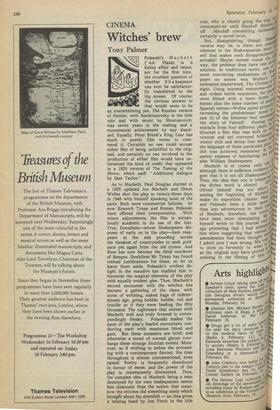CINEMA
Witches' brew
Tony Palmer
Polanski's Macbeth (' AA ' Plaza) is a flabby affair and raises, not for the first time, the troubled question of whether S h a kespeare can ever be satisfactorily transferred to the big screen. Of course, the obvious answer to that would seem to be an overwhelming yes. The Russian version of Hamlet, with Smoktunovsky in the title role and with music by Shostakovich, was seven years in the making and a monumental achievement by any standard. Equally, Peter Brook's King Lear has much in purely film terms to commend it. Certainly no one could accuse either film of being unfaithful to the orig inal, and certainly no one involved in the production of either film would have en tertained the kind of credit that appeared in a 1929 version of The Taming of the Shrew, which said: " Additional dialogue by Sam Taylor."
As to Macbeth, Paul Douglas starred in a 1955 updated Joe Macbeth and Orson Welles shot the play in twenty-three days in 1948 with himself speaking most of the parts. Both were commercial failures. So now Kenneth Tynan and Roman Polanski have offered their interpretation. With minor adjustments, the film is scrupulously academic in its use of the text. True, Donalbain—whom Shakespeare disposes of early on in the play—here reappears at the end pounding across the bleakest of countrysides to seek guidance yet again from the old crones. And Ross has now become the third murderer of Banquo. Doubtless Mr Tynan has found textual justifications for these, so let us leave them aside. Polanski's evident delight in the macabre has enabled him to fantasise the magical elements of the play with equally evident glee. Thus, Macbeth's second encounter with the witches has become a gathering of the clans, with acres of writhing, naked hags of indeterminate age, going bubble, bubble, toil and trouble as if they were feeding the fifty thousand. The nightmare that ensues with Macbeth well and truly fevered is corres pondingly freaky. Polanski makes the most of the play's fearful encounters, conducting each with maximum blood and guts. But these moments are brief, and otherwise a mood of surreal gloom overhangs these strange Scottish events. Moreover, as if wishing to imbue the proceeding with a contemporary flavour, the tone throughout is almost conversational, even Casual. Poetry is frequently abandoned in favour of sense, and the power of the play is consequently diminished. Thus, the complex idea of Macbeth being a man destroyed by his own inadequacies seems less dominant than the notion that somehow the witches did something nasty which brought about his downfall — an idea given a helping hand by Jon Finch in the title role, who is clearly going the way consumptives until Macduff finishes. off. Macduff committing euthane518 certainly a novel twist. But, disappointing though Polanso version may be, is there not sornethig inherent in the Shakespearian beast self that makes such disappointmentso evitable? Maybe turned round the eio way, the problem does have one c'essi solution. In traditional terms, one ,.efoe.t most convincing realisations of s" peare on screen was Welles's estimated masterwork, The Chimes ate c night. Using minimal resources--thed and violent battle sequences, for ear tl were filmed with a mere dozen le horses plus the same number of PIS Spanish extras—Welles opted prinlar;; fo recreating the predominant mood lit saw it) of the histories that enc0n1Pdti? the story of Falstaff. Piecing t,,e:01 J11 extracts from four different plaYs, structed a film that was both an t1 SP' concept and yet conveyed brillian''io Fri wintry chill and decay that seeps til y the language of those particular Pl0Yb5e this was achieved, remember, at eti parent expense of butchering the 'gr( able William Shakespeare. M 011Macbeth is of course only00.1, although there is sufficient evidence," It gest that it is not all Shakespeare.siCThus, the idea that one is tarnPeAriffljeri 1,841 the divine word is absurd. Olivier himself was not above.,101 anising the beginning of RicharAe ithE make its exposition clearer. It 0,1:11 and Polanski been a little 51°rp:g,Za than less adventurous in their t'" #'14 of Macbeth, therefore, the ree have been more stimulating. himself wrote to this journal nve'resecirlil ago protesting that I had naisreP t,e him when suggesting that varionsed eti amendments had been thought11„,e,Vaea 14,11h I admit now I was wrong. His ve," to stick so fervently to what 70 hitncl as the original may have proved 00?Thati undoing in the filming of the 41
A










































 Previous page
Previous page